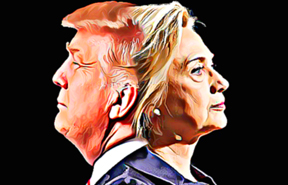President Clinton, President Trump: What Do They Mean For Fuel?
![]() Print this Article | Send to Colleague
Print this Article | Send to Colleague
 Tuesday, November 8 is the long-awaited presidential elections for the United States. Despite the passionate and at-times colorful conversation on immigration, national security, and jobs, Democratic candidate Hillary Clinton and Republican candidate Donald Trump have spent relatively little time discussing energy policy.
Tuesday, November 8 is the long-awaited presidential elections for the United States. Despite the passionate and at-times colorful conversation on immigration, national security, and jobs, Democratic candidate Hillary Clinton and Republican candidate Donald Trump have spent relatively little time discussing energy policy."Energy issues are not the first things out of their mouths—that’s a little disconcerting," says Paige Anderson, Director of Government Relations for NACS (National Association of Convenience Stores and Fuel Retailing). Energy used to be one of the top issues presidential candidates targeted in previous campaigns, says Anderson. Finding details on the candidates’ energy policy is a challenge in itself. At Clinton’s campaign page, energy is part of a wider discussion on climate change, and at Trump’s, it is part of a multi-bulleted economic proposal.
Maybe it’s the combination of sustained low energy prices and high domestic production that has made energy a nonissue. Regardless, there is no doubt that the next president of the United States will have a big effect on the fuels business in the decades to come.
Consider President Barack Obama’s introduction of tougher Corporate Average Fuel Economy (CAFE) targets, new underground storage tank (UST) regulations and continuation of the Renewable Fuel Standard (RFS) blending mandates. While energy may not be the first talking point, there are enough policy proposals and candidates' comments to get a feel for how a Clinton and Trump White House would define its priorities.
The consensus on Clinton: Her administration would essentially be a third Obama term when it comes to energy. Some argue it might be even more ambitious in its regulatory reach.
"Hillary would continue Obama’s legacy and expand on it," says Sherri Stone, Vice President of Petroleum Marketers Association of America (PMAA). Stone cites Clinton’s proposal to crack down on fracking, deliver on Obama’s pledged greenhouse-gas cuts at the Paris climate conference, and her support from environmental groups.
Among Clinton’s proposals is a pledge to slash U.S. oil consumption by a third through "cleaner fuels" and "more efficient" cars and trucks. She would cut federal subsidies for the oil and gas industry, and defend and extend vehicle pollution and efficiency standards (see CAFE standards) as well as the Clean Power Plan. Electric vehicles (EVs) are a preferred technology, as well as energy alternatives such as solar.
Trump’s energy proposals run in the opposite direction of Clinton’s, including opening up more federal lands to exploration and drilling, rescinding the Clean Power Plan and Waters of the United States Rule, and canceling the Paris climate commitments.
"Trump will be far better for marketers and retailers," says Stone of PMAA, pointing out Trump’s pledge to end Obama regulations on the oil industry and his criticism of the Environmental Protection Agency (EPA), which he has suggested turning into a commission.
Trump is clearly focused on reducing the regulatory burden on the energy industry, but Anderson of NACS would like to see more details from the candidate.
"We would like to see some more specifics from the campaign and be able to talk about energy in a more holistic way," she says. "It’s good to focus on production, but we have to look further downstream. What types of fuel does he want to see us using, what vehicles does he want to see Americans driving 20 years down the road?"

